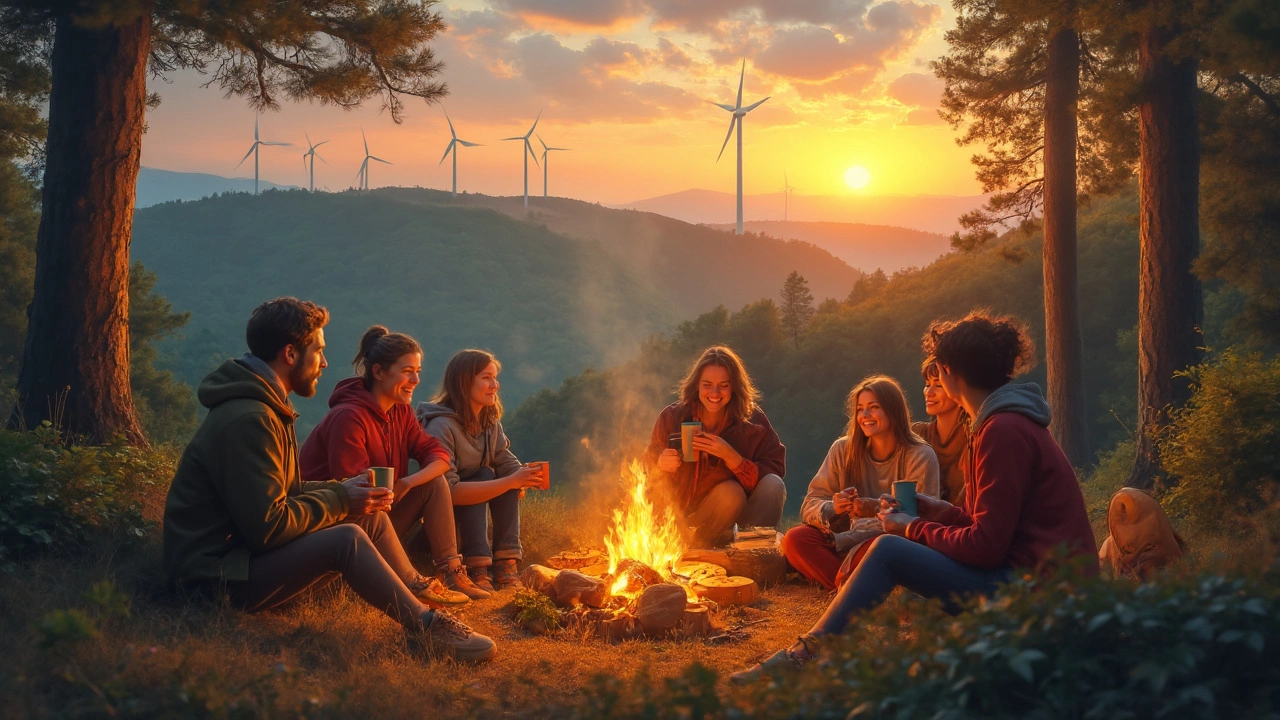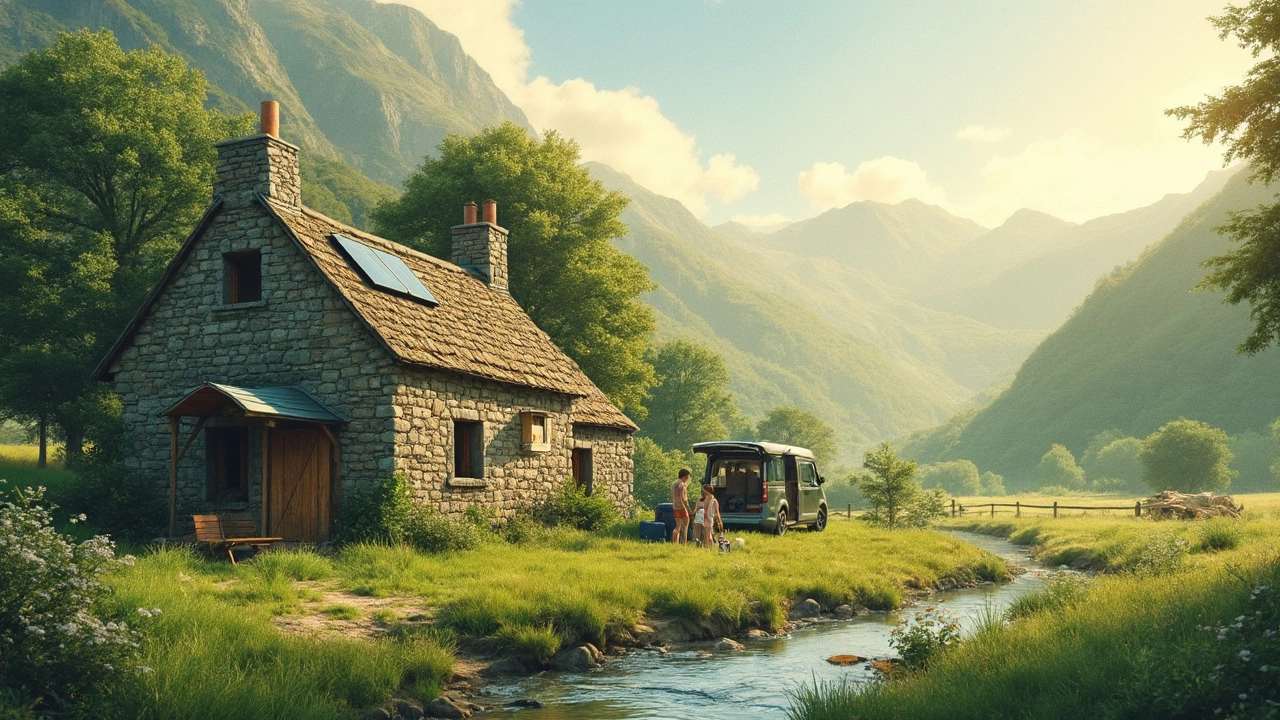Camping, whether in a tent or an eco-friendly cottage, is all about immersing yourself in nature. To truly respect the great outdoors, there's a golden rule to follow: leave no trace. This means, quite simply, that you should leave the nature around you as pristine as you found it. How do we put this into practice, particularly when cozying up in a cottage? Let's dive into some straightforward tips to ensure a sustainable camping experience.
First things first, consider the materials and energy sources used by the cottage. Many eco-cottages are now designed with sustainability in mind, using renewable energy sources like solar panels and built with natural materials that blend effortlessly with their surrounding environment. Opt for these when booking your stay!
Next, think about your consumption habits. Pack reusable items—water bottles, utensils, and bags—to minimize waste. It not only helps the environment but also lightens the load and simplifies your experience. Keep an eye out for recycling bins and use them wherever possible, or take your recyclables with you if facilities aren't available.
- Understanding Eco-Friendly Practices
- Choosing the Right Cottage
- Sustainable Camping Tips
- Embracing Nature Responsibly
Understanding Eco-Friendly Practices
So, what exactly are eco-friendly practices in the wonderful world of camping, especially when it comes to staying in cottages? Well, it starts with understanding and respecting our environmental impact. It's about making choices that reduce harm and encourage harmony with nature.
Reducing Waste
One of the central pillars of being eco-friendly is cutting down on waste. Think about all the stuff we bring on camping trips. It's easy to fall into the trap of using single-use plastics and other disposables. Instead, bring along reusable items; they contribute significantly to reducing waste. Some people are surprised at how little effort it takes to bring a bamboo cutlery set or a metal straw rather than grabbing the plastic ones.
Energy Consumption
Eco-friendly cottages often score big here by using clean energy. Solar panels, for instance, are common in these setups. Not only do they supply renewable energy, but they also reduce the carbon footprint substantially. If you're staying in one of these cottages, consider turning off lights and unplugging devices when not in use—small acts that add up.
Sustainable Practices
Many eco-friendly cottages are built using sustainable materials, like reclaimed wood or recycled metal. These materials not only last longer but are also sourced in a way that minimizes environmental damage. This is something to look out for when deciding where to stay.
Water Conservation
It's easy to overlook, but water conservation is key. Use water sparingly, whether it's turning off the tap while brushing your teeth or opting for shorter showers. Eco-cottages often have low-flow showers and toilets already in place, making it easier to conserve without even thinking about it.
Community Involvement
Many eco-friendly lodges engage with their local communities, supporting local artisans and businesses. By choosing to stay at these places, you're not only helping the environment but also contributing to the local economy.
Embracing these sustainable practices isn't just about protecting the earth, but also about enhancing your camping experience. It makes your adventure more meaningful, knowing that you're doing your part to respect and preserve the stunning beauty of nature.
Choosing the Right Cottage
When it comes to picking the perfect eco-friendly cottage, there's more than just location to think about. One of the first things to consider is the cottage’s sustainability credentials. Look for certifications like LEED (Leadership in Energy and Environmental Design) or Green Key Global, which indicate that the property meets rigorous environmental standards.
Sustainable Materials are key. Cottages made from reclaimed wood or locally sourced materials not only reduce your carbon footprint but also tend to blend beautifully with the natural landscape. This harmony with nature can make your stay more immersive and tranquil.
Energy Efficiency is critical too. Check if the cottage employs renewable energy sources like solar panels or wind turbines. You'll often find eco-cottages equipped with energy-efficient appliances and LED lighting, which together reduce the total energy consumption.
Water Conservation
Water is a precious resource, and many eco-cottages focus on conservation techniques. Features like low-flow toilets, rainwater harvesting systems, and efficient irrigation for any nearby gardens can make a massive difference. A fun fact: some innovative cottages even have green roofs that help manage stormwater runoff while providing insulation.
Waste Management
Pay attention to how the cottage manages waste. Facilities that offer thorough recycling and composting opportunities support a low-impact stay. Some places even provide organic waste bins that contribute to natural fertilizer for local planting efforts.
Lastly, it can be insightful to read reviews from previous guests. Camping enthusiasts often share their experiences about the property’s commitment to eco-friendliness. These firsthand accounts can be invaluable in guiding your decision.
| Key Features | Benefits |
|---|---|
| Reclaimed Materials | Reduces environmental impact |
| Renewable Energy | Lower energy costs and carbon footprint |
| Water Conservation Systems | Decreases water use |

Sustainable Camping Tips
There's no doubt that camping is a delightful way to escape the daily grind and reconnect with nature. The trick is to do it sustainably, so nature stays intact for everyone. Whether you're under a tent or in an eco-friendly cottage, these tips will make your adventure kind to the environment.
Pack Smart and Light
Start by thinking about what you really need. A light backpack is easier on you and the planet. Go for natural materials like cotton or bamboo, and reusable items that won't end up as waste. Think of washable cloths instead of paper towels, and a sturdy bottle to refill as you go.
Use Eco-Friendly Products
From biodegradable soap to solar-powered chargers, using green products reduces your environmental footprint. When you're booking a cottage, ask if they provide eco-friendly amenities or if you should bring your own.
Respect Wildlife
No one wants their camping memories filled with raccoon raids! More importantly, feeding wildlife or leaving food out disrupts their natural diet patterns. Store food securely and clean up after meals. It keeps the animals safe—and your site clean.
Leave No Trace
- Stick to marked trails and paths.
- Collect all your trash and take it with you—yes, even if it's biodegradable.
- If you spot others littering, kindly remind them to leave no trace.
Go Digital
Instead of printed maps and brochures, download what you need. Most parks have handy guides and directories available in digital formats.
Conserve Water and Energy
A cottage with a sustainable design often has built-in energy savers like low-flow toilets and LED lights. Help by taking shorter showers and switching off lights once your marshmallow roasting is done!
Embracing Nature Responsibly
When you're nestled in the midst of the great outdoors, it's crucial to engage respectfully with the environment. Think of it as being a considerate guest in nature's home, where actions have real impacts.
How to Respect the Wildlife
One of the most important aspects of camping is understanding the wildlife around you. Always observe animals from a distance. Feeding them might seem harmless, but it can lead to dependence on humans and even health problems for the animals. As the National Park Service advises,
“Feeding wildlife is punishable by law because it disrupts natural hunting or foraging behaviors.”
Stick to Marked Trails
It's tempting to wander off the beaten path, but doing so can cause erosion and damage delicate ecosystems. Sticking to marked trails ensures that you're protecting the land while still enjoying the beauty of nature.
Light Campfires Responsibly
If you're planning to light a campfire, ensure it's within a designated fire pit and fully extinguished before you leave. According to the Forest Service, unattended campfires are a leading cause of forest fires. Remember, safety first!
Mindful of Trash and Waste
Bring reusable trash bags to collect all your waste. If you encounter other people's litter, consider picking it up—it's a little effort that goes a long way. And speaking of waste, ensure that all human waste is disposed of properly, following the campsite or cottage guidelines.
When you embrace eco-friendly camping in cottages, these small actions combine to create a huge positive impact, preserving our natural beauty for generations to come.
